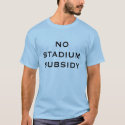Today's letter comes from Santa Clara resident Daniel L.
He writes . . .
I have enjoyed working with several Niner players and staff, particularly those from the Walsh era that came from Stanford. Many have been a big positive for the community. Yet this stadium will only bring pain to the residents.
I grew up living in Palo Alto just a couple blocks from the Stanford football stadium. On game day our streets were barricaded to keep traffic out... and us in. The major streets were gridlock with police directing traffic at the intersections. So called "special events" (such as the Olympics and World Cup Soccer) were even worse. Police and military helicopters would circle the area for days (and nights) in advance. Areas of interest to terrorists would feature police with automatic weapons along with bomb sniffing dogs.
Meanwhile, drunks and lowly individuals would wander through the neighborhoods looking for crimes of opportunity since the police were busy directing traffic and handling crowd control. The same thing occurs in Oakland, South San Francisco, Berkeley, etc.
Have you ever noticed how football stadiums are seldom ever in [the] nice part of town???
If owning a stadium is such a great financial opportunity then why are not Alviso and East Palo Alto fighting to get a stadium?
Considering that Santa Clara cannot afford to repair the streets in several neighborhoods, staff a library east of highway 101, repair the international swim center, fill 30 or so vacant city positions... and has been reducing services by cutting library and police station hours... we clearly cannot afford to be in the stadium business.
Daniel raises an important issue that we haven't yet discussed in great detail here at Stadium Facts — how the stadium will impact the residential and commercial areas near the stadium. From the information the San Francisco 49ers have presented to the City Council, Santa Clara residents who live near the stadium can expect the same traffic congestion and controls Daniel experienced living near the Stanford stadium.
In their presentation to the City Council on April 24, Larry MacNeil, the 49ers CFO, addressed the issue of traffic controls around the stadium on event days. According to their plans (please see their report for the full details) traffic on all of the streets surrounding this area would be severely limited on game days. In fact, a portion of Tasman Drive would be completely closed, and other surrounding streets would be closed post-game. (Unless you live in those areas, in which case you'll have to get permission from a police officer to pass into your own neighborhood.)
And these traffic restrictions aren't just an issue for residents living near the stadium. Who would brave the stadium traffic to go to a movie at the AMC Mercado on an event day? Unless you live close enough to Rivermark Plaza to walk there, would you even consider trying to shop there on an event day?
And, of course, there's the continuing issue of misplaced priorities. Daniel identifies several more pressing concerns he sees for the city — street repairs, library services, swim center improvements, a hiring freeze — and we all may have ideas on how the city should spend that money. Or NOT spend it, for that matter.
How would you like the city to invest $180 million?

2 comments:
Byron,
In the letter to the editor today you post at the bottom of the letter "How would you like to invest the $180 million?" What you need to remember that the money the City puts up would most likly be revenue from the sale of bonds. That would be a debt that the City incurrs to invest in the stadium.
Would you mortgage your home to spend the money in an unkown investment scheme?
EdR
I think your comment was actually addressed to me, but it's a great point Ed.
This isn't cash that's sitting around waiting to be invested. The city doesn't have that kind of money.
The two possible financing options I've heard are money from the utility funds and the sale of bonds.
Bonds will certainly be used for the Stadium Authority -- the 49ers have already made that clear. Those bonds would be necessary because the Stadium Authority won't have the cash from naming rights, etc. until after the stadium is operating, but they need the cash at the time of construction.
The city's portion will probably come from a mix of bonds and utility reserve fund money.
And, as you note Ed, bond money isn't free money. Do we want to mortgage our house to find the money for this?
Post a Comment